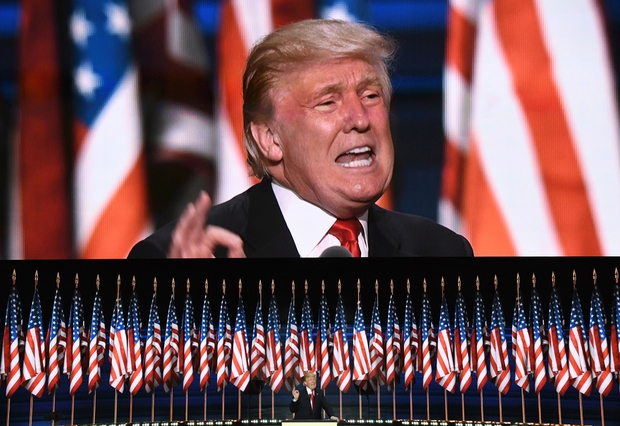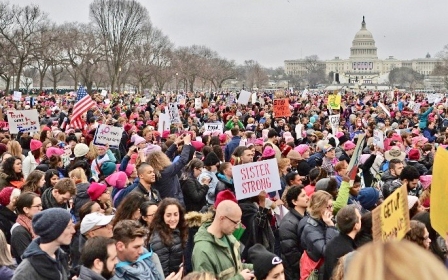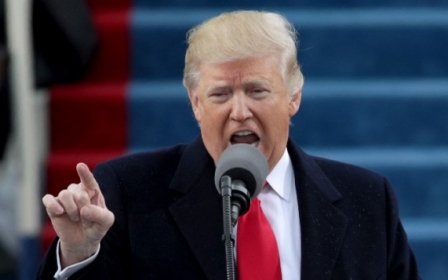Trump promises 'big day' as Middle East citizens face visa crackdown

Donald Trump is expected to sign executive orders starting on Wednesday that include a temporary ban on most refugees and a suspension of visas for citizens of Syria and six other Middle Eastern and African countries, say congressional aides and immigration experts briefed on the matter.
The US president, who said on Twitter that a "big day" was planned on national security on Wednesday, is expected to ban for several months the entry of refugees into the United States, except for religious minorities escaping persecution, until more aggressive vetting is in place.
Another order will block visas being issued to anyone from Syria, Iraq, Iran, Libya, Somalia, Sudan and Yemen, said the aides and experts, who asked not to be identified.
In his Twitter post late on Tuesday, Trump said: "Big day planned on NATIONAL SECURITY tomorrow. Among many other things, we will build the wall!"
The National Iranian American Council (NIAC) said Trump was "making good on the most shameful and discriminatory promises he made on the campaign trail".
"It is notable that the list doesn’t include Saudi Arabia and would have done nothing to prevent 9/11 or the other terrorist attacks committed by radical Wahhabi jihadists in the US," the NIAC said in a statement. "But it does include Iran – from which no national has committed a terrorist act in America."
The border security measures probably include directing the construction of a border wall with Mexico and other actions to cut the number of illegal immigrants living in the United States.
The sources say the first of the orders will be signed on Wednesday. With Trump considering measures to tighten border security, he could turn his attention to the refugee issue later this week.
Stephen Legomsky, who was chief counsel at US Citizenship and Immigration Services in the Obama administration, said the president had the authority to limit refugee admissions and the issuance of visas to specific countries if the administration determined it was in the public’s interest.
"From a legal standpoint, it would be exactly within his legal rights," said Legomsky, a professor at Washington University School of Law in St Louis. "But from a policy standpoint, it would be a terrible idea because there is such an urgent humanitarian need right now for refugees.”
Bana Alabed appeals to Trump to help Syrians
The Republican president, who took office last Friday, was expected to sign the first of the orders at the Department of Homeland Security, whose responsibilities include immigration and border security.
During his presidential campaign, Trump initially proposed a temporary ban on Muslims entering the United States, which he said would protect Americans from terrorist attacks.
Both Trump and his nominee for attorney general, Senator Jeff Sessions, have since said they would focus the restrictions on countries whose migrants could pose a threat, rather than a ban on those of a specific religion.
Many Trump supporters decried former President Barack Obama's decision to increase the number of Syrian refugees admitted to the United States over fears that those fleeing the country's civil war would carry out attacks.
Legal challenges
Detractors could launch legal challenges if all the countries subject to the ban are Muslim-majority nations, said immigration expert Hiroshi Motomura at UCLA School of Law.
Legal arguments could claim the executive orders discriminate against a particular religion, which would be unconstitutional, he said.
"His comments during the campaign and a number of people on his team focused very much on religion as the target," Motomura said.
To block entry from the designated countries, Trump is likely to tell the State Department to stop issuing visas to people from those nations, according to sources familiar with the visa process. He could also instruct US Customs and Border Protection to stop any current visa holders from those countries from entering the United States.
White House spokesman Sean Spicer said on Tuesday the State and Homeland Security Departments would work on the vetting process once Trump's nominee to head the State Department, Rex Tillerson, is installed.
Other measures may include directing all agencies to finish work on a biometric identification system for non-citizens entering and exiting the United States and a crackdown on immigrants fraudulently receiving government benefits, according to the congressional aides and immigration experts.
To restrict illegal immigration, Trump has promised to build a wall on the U.S.-Mexico border and to deport illegal migrants living inside the United States.
Trump is also expected to take part in a ceremony installing his new secretary of homeland security, retired Marine General John Kelly, on Wednesday.
New MEE newsletter: Jerusalem Dispatch
Sign up to get the latest insights and analysis on Israel-Palestine, alongside Turkey Unpacked and other MEE newsletters
Middle East Eye delivers independent and unrivalled coverage and analysis of the Middle East, North Africa and beyond. To learn more about republishing this content and the associated fees, please fill out this form. More about MEE can be found here.




